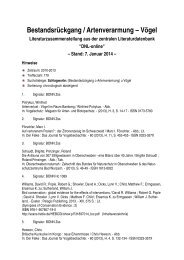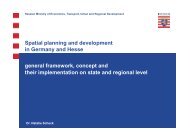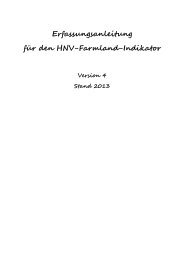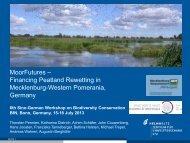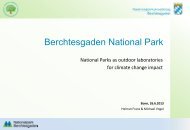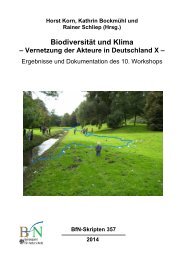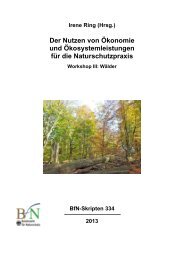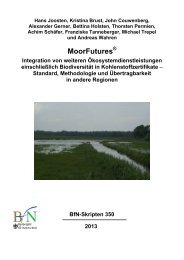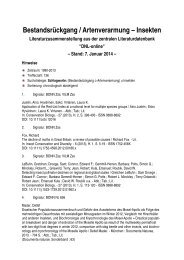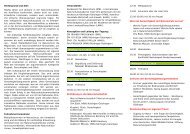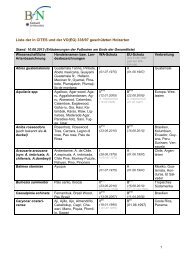Caring for Pollinators - Bundesamt für Naturschutz
Caring for Pollinators - Bundesamt für Naturschutz
Caring for Pollinators - Bundesamt für Naturschutz
You also want an ePaper? Increase the reach of your titles
YUMPU automatically turns print PDFs into web optimized ePapers that Google loves.
Steffan-Dewenter Pollinator declines and loss of pollination services<br />
Consequences of pollinator declines <strong>for</strong> crop pollination<br />
In a recently published review on the “Importance of pollinators in changing landscapes <strong>for</strong><br />
world crops” by Alexandra Klein from the University of Göttingen and coauthors we evaluate<br />
the reliance of world crop production on animal pollination based on primary data from 200<br />
countries (Klein et al. 2007). We found that fruit, vegetable or seed production from 87 of the<br />
leading global food crops is dependent upon animal pollination, while 28 crops do not rely<br />
upon animal pollination. <strong>Pollinators</strong> turned out to be essential <strong>for</strong> 13 crops, while production<br />
is highly pollinator dependent <strong>for</strong> 30, moderately <strong>for</strong> 27, slightly <strong>for</strong> 21, unimportant <strong>for</strong> 7, and<br />
is of unknown significance <strong>for</strong> the remaining 9 crop species.<br />
In the context of the EU-project ALARM we per<strong>for</strong>med collaborative crop studies in five<br />
different countries with a focus on annual field crops (Figure 4). Crop fields were studied<br />
along gradients of increasing land use intensification to evaluate the possible loss of<br />
pollination services in monotonous agricultural landscapes without source habitats <strong>for</strong><br />
pollinators (Figure 3). The data indicate that lower visitation rates in such landscapes result<br />
not only in lower yields but also negatively affect yield quality (Bommarco et al., submitted).<br />
Further, Bernard Vaissère and coworkers from INRA Avignon assessed the monetary value<br />
of insect pollinators in Europe. The total economic production value of 80 crops used directly<br />
<strong>for</strong> human food was 127.7 billion € in 2005. 41 of these crops depend or benefit from insect<br />
pollination <strong>for</strong> their production resulting in an estimated annual economic value of pollinators<br />
in Europe of 12.3 billion € (Gallai et al. 2008).<br />
Fig. 4: Collaborative crop studies in 5 countries per<strong>for</strong>med in the framework of the EU-project<br />
ALARM<br />
104




